IVF over 40 – Success Rates, Egg Quality, Donor Oocytes
Pregnancy after 40 is a common practice for modern women. People think about creating a family and having children, mainly at an older age, even though all reproductive specialists share the opinion that it is reasonable to give birth before 40 years. It equally applies to those who have not yet given birth and have already become mothers in their youth. That is how nature works – our potential for motherhood at 40+ is not the same as at 30. But there are reproductive technologies. They help in finding parental happiness at forty or even later. That’s why in this post, we will cover all you need to know about IVF over 40.
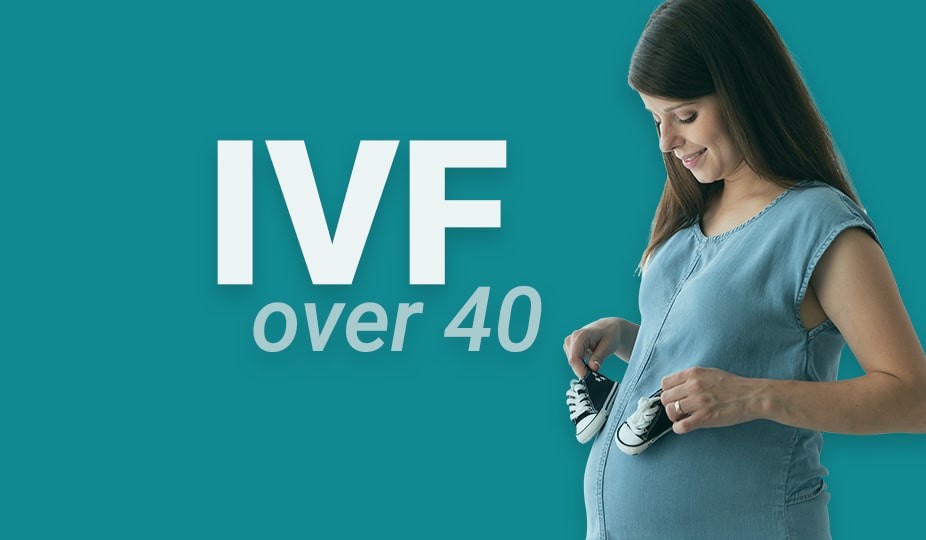
The Most Important Thing about IVF over 40
Successful IVF after 40 years is a reality. However, the path to cherished motherhood in late reproductive age is usually more difficult than in younger women. Age reduces the IVF program’s success chances. Therefore, often a dream does not come true immediately but needs several attempts.
The main difficulties that can interfere with the success of IVF over 40:
- the weak response of the ovaries to stimulation with hormonal drugs – this makes it difficult to obtain viable eggs;
- a decrease in the number of euploid embryos, healthy and feasible for transfer into the uterine cavity;
- low probability of pregnancy due to problems with embryo implantation – 40-year-old patients of IVF clinics become pregnant less often than younger women.
The heart of these difficulties is reduced ovarian reserve due to age. The number and quality of oocytes begin to decline after 35; after 40, this process accelerates. However, some different approaches and methods can help to circumvent these natural difficulties. If they do not work, then the donor program becomes the solution. Besides, upon reaching a certain age, doctors might immediately recommend a woman to use donor oocytes. Thus, IVF at the age of 47 almost always operates with donor eggs.
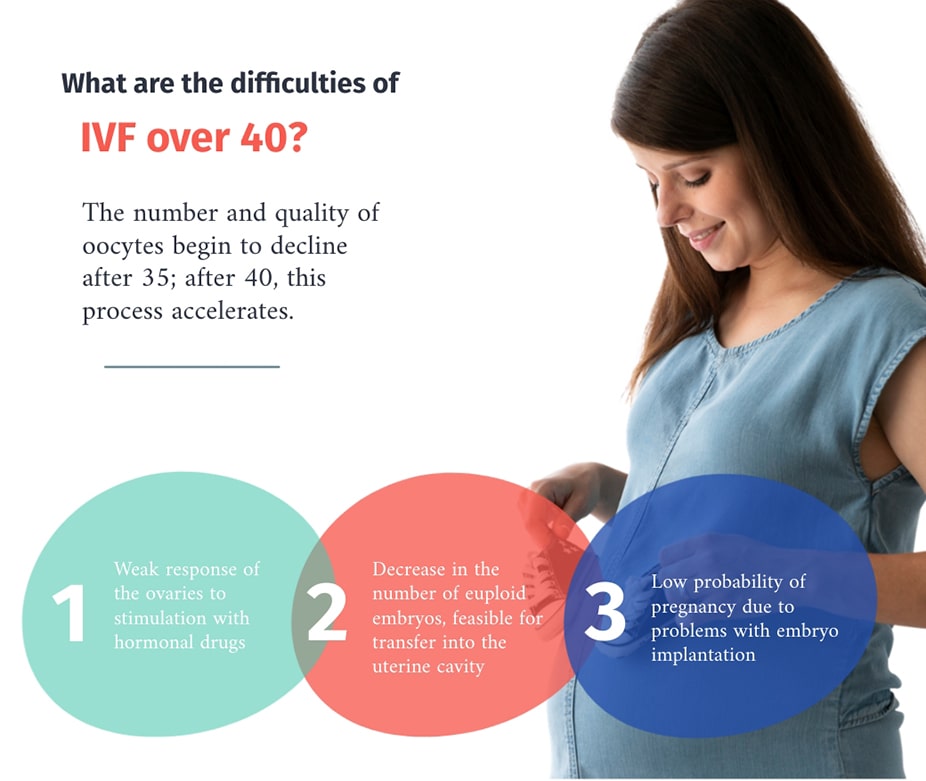
What can a woman do to make her desire to become a mother come true? Do not hesitate to make an appointment with a reproductologist. It is necessary to consult a specialist after six months of unsuccessful pregnancy attempts. Time is the main value in the ART program.
IVF over 40 with Own Eggs
So, the main difficulty in patients of late reproductive age is getting healthy eggs. How to grow a sufficient number of oocytes suitable for in vitro fertilization with a reduced ovarian reserve?
Standard protocols – like the short one with stimulation – don’t work well. There are exceptions when a woman over 40 becomes a mother after a traditional IVF. Unfortunately, not every woman is so lucky.
There is no universal program for expectant mothers of the older age group. All women require an individual approach. Doctors can use an entire range of IVF protocols. Here are some of the schemes that doctors apply especially often.
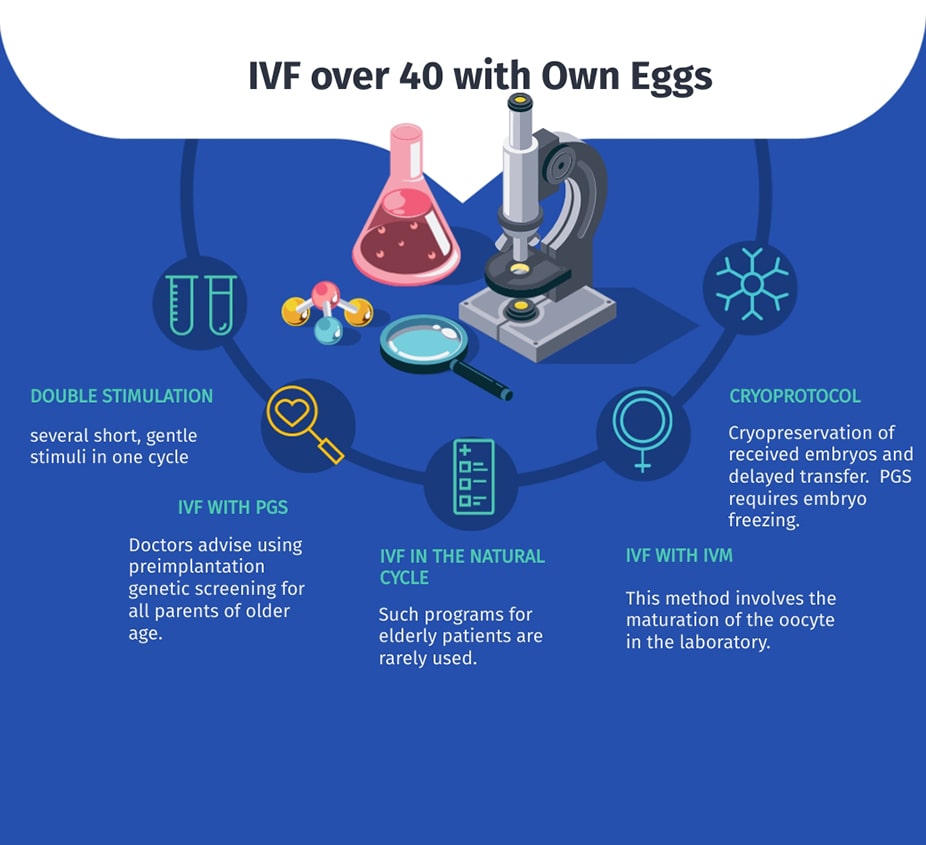
IVF with Double Stimulation
This approach shows good results with a reduced ovarian reserve. It consists of carrying out several short, gentle stimuli in one cycle.
IVF with PGS
Doctors advise using preimplantation genetic screening for all parents of older age. The reason is that the risk of chromosomal abnormalities in embryos increases with age. Preimplantation genetic screening ensures against many ineffective IVF attempts, miscarriage, and giving birth to a child with congenital anomalies.
IVF in the Natural Cycle
When the body does not give the desired response to stimulation, doctors can prescribe natural cycle IVF. But such programs for elderly patients are rarely used.
IVF with IVM (in vitro maturation)
If it is impossible to obtain a mature germ cell, doctors use IVM. This method involves the maturation of the oocyte in the laboratory.
Cryoprotocol
In older patients, doctors often use the protocol with cryopreservation of all received embryos and delayed transfer. The main reason is that PGS requires embryo freezing.
It is important to understand that every woman’s reproductive system is unique. It is getting critical with age, when past diseases, stress, etc., influence fertility. Therefore, a successful result with a specific protocol in one patient does not mean that this scheme will help another woman of the same age.
The attending reproductologist selects a protocol based on the study of anamnesis, history of infertility treatment, and both partners’ examination results. It is important to trust your doctor and follow the instructions.
IVF over 40 with Donor Eggs
If programs with their oocytes do not give results or are unpromising, doctors recommend patients in vitro fertilization with donor biomaterial. For example, when several IVF attempts with their eggs did not lead to pregnancy, or the examination showed ovarian failure. The older the expectant mother is, the better it is to use donor oocytes.
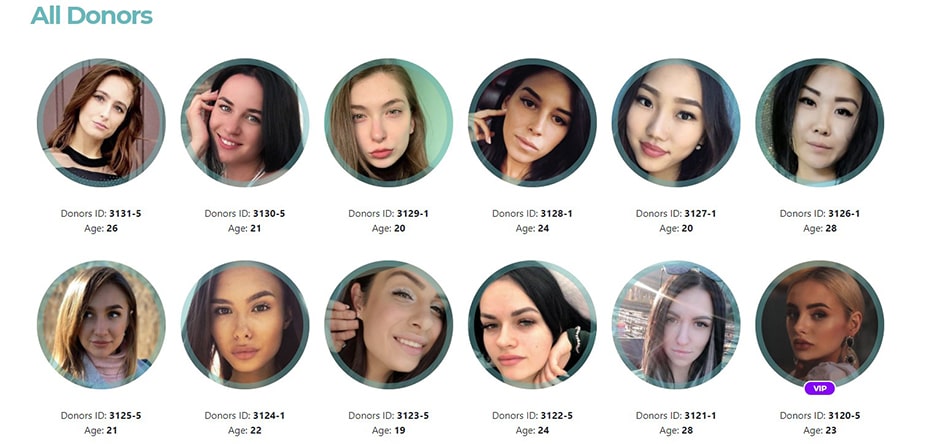
IVF with donor eggs after 40 years, in contrast to the use of one’s own oocytes, does not require the use of any specially modified protocols. The main thing is to ensure that the patient’s body is ready for embryo transfer and can carry the baby. The probability of pregnancy in the donor program is very high because donors undergo a very strict medical check-up. Besides, they are always young women.
What percentage of women in this age group can succeed?
Approximately 20%. The first thing we struggle with is a reduced ovarian reserve — a woman’s eggs age along with her body. As for the men, with age, they have a reduced sperm count and motility. According to our investigation, on average, 17% of women over 40 get pregnant via IVF during the first attempt. Cryocycle can increase the chance to 21%. Unfortunately, this is 2.5 times less compared to IVF success rates for women under 40.
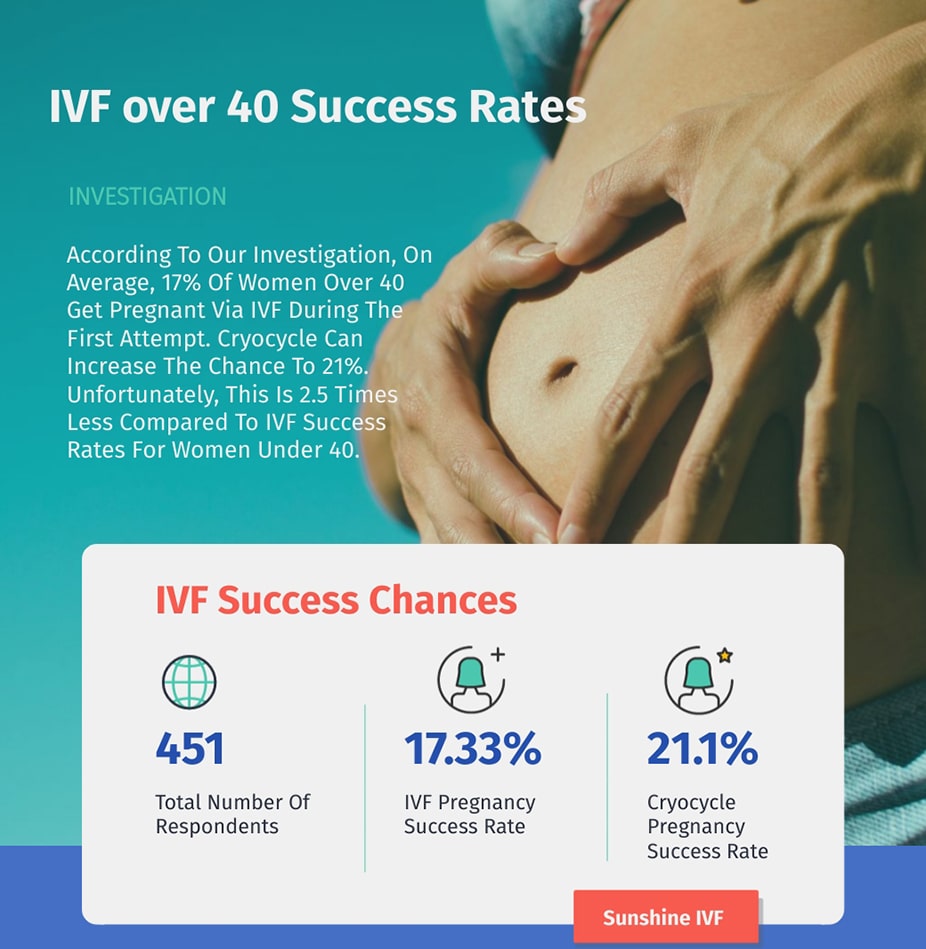
IVF and ICSI Age Groups
| Age, y.o. | Number of respondents | % | Pregnancy success rate % | |
|---|---|---|---|---|
| 1 | Under 25 | 234 | 9.6% | 13.66% |
| 2 | 25-29 | 405 | 16.7% | 44.43% |
| 3 | 30-34 | 896 | 36.9% | 47.66% |
| 4 | 35-39 | 542 | 22.4% | 45.33% |
| 5 | Over 40 | 348 | 14.3% | 17.33% |
| 6 | Total | 2425 | 100% | 37.28% |
Cryo Cycle Age Groups
| Age, y.o. | Number of respondents | % | Pregnancy success rate % | |
|---|---|---|---|---|
| 1 | Under 25 | 60 | 3.4% | 41.7% |
| 2 | 25-29 | 544 | 31% | 43.5% |
| 3 | 30-34 | 646 | 36.8% | 46.5% |
| 4 | 35-39 | 402 | 22.9% | 43.2% |
| 5 | Over 40 | 103 | 5.8% | 21.1% |
| 6 | Total | 1755 | 100% | 43.3% |
After 40 years old, 20 out of 100 women get pregnant after the first attempt. What about the other 80 women? One more IVF program? Donor eggs?
If a woman has embryos from the first attempt, the doctors can use them to make a cryo cycle attempt. However, the patient should be aware of all possible risks and complications of subsequent IVF attempts, namely:
- the pregnancy rate in such women is 10-15%;
- the risk of aneuploidies (chromosomal abnormalities) after 40 years reaches 80%.
However, if a woman fully understands the risks and has the desire and capabilities, then, of course, we can try to make another IVF attempt. However, with a reduced ovarian reserve, donor oocytes are the only chance.
Can donor eggs guarantee pregnancy?
They don’t. However, the chances increase by about 50-60%. Although it also depends on the donor.
Clear. But there are enough women whose ovaries are still functioning after 40 years. Why can’t they get pregnant naturally?
There are enough women after 40 who have functioning ovaries, but there are many more reasons for infertility besides the ovaries. Some of them are:
- male infertility;
- obstruction of both fallopian tubes or their absence;
- pathology of the uterus;
- endometriosis;
- Immunological incompatibility.
Most common infertility causes:
- Combined factors 34%
- Tubal factor (absence or obstruction of the fallopian tubes) 25%
- Hormonal factor (no ovulation) 15%
- Endometriosis-related 7%
- Uterine factor 6%
- Male factor 13%
What are the risks of infertility treatment with the help of assisted reproductive technologies for women over 40? Are there any possible complications?
Negative consequences for women’s health can occur at any stage of IVF. The risks grow with the patient’s age. Let’s talk about some of them in detail.
Ovarian hyperstimulation
It can occur if the woman’s ovaries overreact to medications and produce much more oocytes than needed. But today, we have learned how to prevent this complication.
Multiple pregnancies
It all depends on the doctor’s experience because the specialists should carefully select the drug’s dose to control the stimulation and choose a limited amount of embryos for the transfer.
Endocrine disorders
IVF affects the thyroid gland and adrenal cortex. Therefore all patients should have an endocrinologist’s consultation before the program and receive corrective treatment during the stimulation if they have any endocrine issues.
Cardiovascular system disorders
Patients with hypertension or vascular diseases can have complications as a result of hormonal stimulation. A physician and cardiologist correct these complications and more closely monitor patients` health.
Early aging
It is one of the important issues of concern to many patients. There is an opinion that women who tried IVF have menopause earlier. The evidence base is insufficient at the moment. The generation of IVF moms, which is increasing every year, shows that the onset of age-related menopause’s timing depends on genetics to the greatest extent.
Shock and depression
Psychological shock and depression can threaten a woman after several unsuccessful attempts.
People actively discuss the relation of related IVF to oncology. Is IVF a catalyst for the development of cancer?
This topic is very acute because many believe that IVF is the cause of malignant processes in a woman’s body. However, there have been many studies, and none found such a connection. The opinion of modern oncologists is quite unambiguous. IVF, or rather large doses of hormones in stimulated cycles, can affect existing tumors’ growth and progress. Quite often, it is impossible to determine them in the early stages, and many tumors (for example, breast cancer), being hormone-dependent, begin to grow after childbirth actively. Therefore, before the protocol, we carefully check the mammary glands (ultrasound; consultation with a mammologist).
Another hot topic is the fetus’s genetic pathologies in older women connected with repeated IVF attempts. What are the chances of conceiving a genetically healthy child after 40 years? After all, there are known facts that starting from the age of 35, the risk of having a child with chromosomal pathologies increases.
Unfortunately, in addition to extragenital and gynecological pathologies, we face the problem of lower egg quality. It is a marker of embryo health, and therefore the health of the unborn child. At present, the percentage of healthy children born after 40 years is 10-15%.
IVF over 40 – Frequently Asked Questions
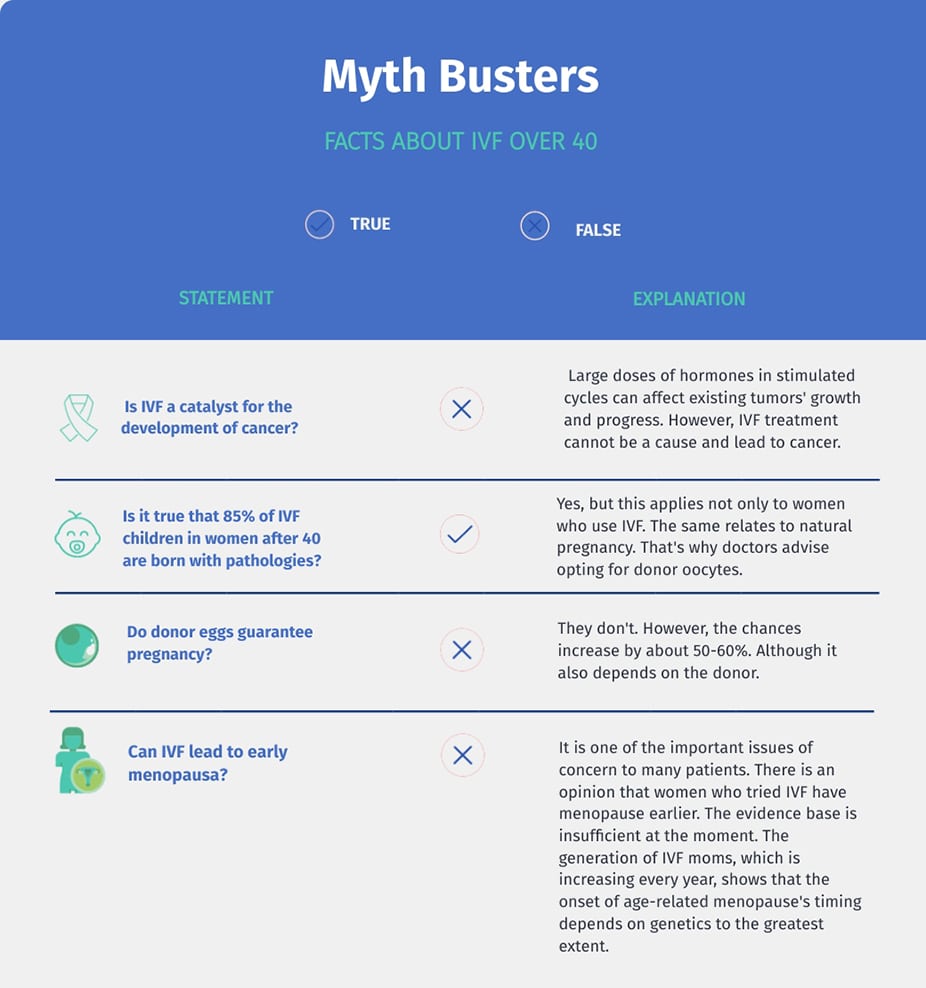
In recent years, there has been a trend towards late pregnancy in the world. The number of women who get pregnant with the first child in their 40s or later is growing. This age group is now giving birth more than ever before.
Various. Among the most common are a second marriage, career, prolonged infertility, financial difficulties, fear of the IVF program, or several unsuccessful IVF attempts.
Yes, but this applies not only to women who use IVF. The same relates to natural pregnancy. That’s why doctors advise opting for donor oocytes.
Not all, unfortunately, but many of them.
Our Attitude to IVF over 40
We believe that the great mission of a woman is the birth of a child. And if it happens when a woman is ready for this step at 40+, a fertility doctor must do everything in one’s power to make this happen. When we manage to achieve pregnancy in a woman after 40 years and give birth to a healthy baby, this is real happiness for Sunshine specialists and doctors at our partner clinics.
